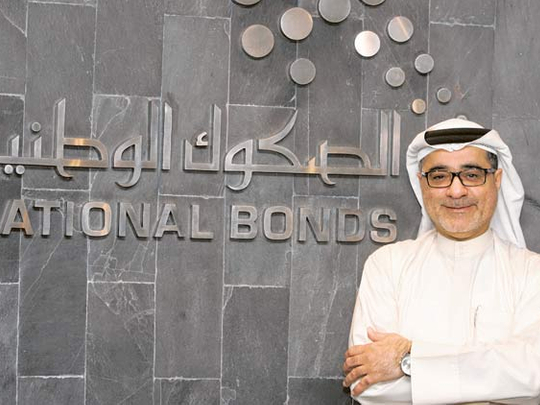
Dubai: National Bonds, the Dubai-based Sharia-compliant saving scheme, has been gaining ground in the UAE. Since its establishment in March 2006, it has worked towards promoting a savings culture. It encourages both Emiratis and expatriates to invest through its competitive annual returns on savings and weekly and monthly cash prize draws.
The company recently released its results which showed a steady investor growth across the whole spectrum of the population and the distribution of a 3.78 per cent profit last year, a year-on-year growth of 6.3 per cent.
Mohammad Qasim Al Ali, CEO of National Bonds, talks about his outlook for 2011 and what needs to be done to promote a much needed savings culture.
Gulf News: Your latest results show you distributed a 3.78 per cent profit last year. Are you happy with these results and how do you hope to gain similar results next year?
Mohammad Qasim Al Ali: The fund has done well and we've managed to leverage the market very well.
We think that the loyalty of our customers coupled with the redistribution of the profit methodology, that we just announced in January, will play a vital role in increasing our profits next year.
As you know we're a highly liquid scheme. After 30 days, bondholders can withdraw their money. That puts pressure on the investment team. They have to keep in mind that bondholders could withdraw from the programme. By encouraging investors to save regularly and to lock their money in for longer periods allows our team to invest their money in other revenues from low risk to higher medium risks which will earn us more profits next year.
How are you seeing people's saving habits change following the financial downturn?
Since the crisis, I've seen a huge shift in the awareness about the importance of savings. We've seen people lose their jobs, salary cuts, certain people had to repatriate some of their family members and children back home. They have now started to pay more attention to their savings. Our database has grown by 9 per cent last year. By the end of 2010 we had over 612,000 customers.
Women are very important to us because they are in control of the home and the finance. They have grown by 11 per cent, male investors have grown by 12 per cent and expatriates by about 11 per cent.
The message is that National Bonds is one of the more attractive tools in the market to save. We are trying to position ourselves as the best, but the message has to be consistent in terms of our value proposition to the public and in terms of visibility in the market. That's what we're working on. We've just hired a company that is specialised on social media such as Facebook and Twitter that will take our message across borders.
Do you have any plans to make National Bonds available GCC-wide?
We are very ambitious on generating first sales across the borders to other GCC countries that's why social media will play a big role in promoting awareness. We are talking to certain countries and strategic partners about establishing a presence on the ground in some of the GCC countries. The biggest market in GCC is Saudi Arabia which would be a priority for us.
How do you encourage people to save?
We are a low risk savings scheme. There are extremes in the investment spectrum and there are conservatives. There are terms, which we give that are better than normal savings accounts because their returns probably range between 0.46 to 1.25 per cent. We try to generate higher returns.
One of the things we are emphasising is the employee savings scheme. As you know expatriates here don't have a retirement scheme. They don't even have a providence scheme. We are positioning National Bonds as an alternative whereby staff can deduct from their monthly salaries a certain amount starting from Dh100 or higher and that is sent to us via their payroll division whereby we issue the bonds electronically. This way people can save even before they get their money. We have an 8 per cent share in M'sharie (Dubai Investments), we have a 13 per cent market share in Taleem which is the education entity, we have a 12 per cent share in Souk Extra and a 51 per cent share in BCS — the strata management company.
As for National Properties, Sky Courts was the flagship project. Customers are visiting the site, flagging their flats for final handover. We have a small portfolio that is income generating. There are still opportunities that offer about 9 to 10 per cent returns in terms of rent in the market so you cannot alienate real estate and say the whole thing has collapsed.
We are on the lookout for attractive venues in the market and with the downturn the costs of having shares is less. Our investment team is looking at these with the consultancy of reputable firms that give us these feasibility studies.
One of the venues that we are looking at is a finance company. Our bondholders have been consistently telling us that they have needs to be looked at and unfortunately the banks have shied away from lending after the crisis. We think that this is a huge opportunity that we could provide to our bondholders. We have a big database [612,000 customers] and that on its own is enough to establish a finance company.
What is your outlook for 2011?
I'm a very positive person in nature and I think there are huge opportunities on the horizon in the UAE market. I think that people need to revisit their expenses first. People think they cannot save but when you revisit your expenses you'll find that you're spending unnecessarily on certain things that you can cut down if not stop completely.
That will give you the chance to save or, if you're already saving then you could save more. In the Middle East, financial planning is not very prominent.
The financial index has clearly indicated that there is a huge lack of awareness and our responsibility as one of the Dubai entities is that we should work hard day and night to inculcate that savings culture by allowing people access to certain tools.
For example on the website there is a savings calculator and an income statement which shows how your savings are going. We will have financial awareness sessions mainly for the housewives who in general are unfortunately ignored by other financial institutions.
Is it important to focus on the young population? What are you doing to focus on this demographic?
You want to shift the mind set here. A lot of graduates are spenders and we want to change that culture by having road shows in colleges and also tie-up with certain colleges and educate them on the importance of saving.
Is this lack of a savings culture UAE specific or is it a worldwide phenomenon?
It's worldwide. The US is the biggest spender when it comes to consumerism. Only 2 to 5 per cent of the population regularly save. There's a certain lifestyle that has been created.
We find however in the rural areas, the spending is less and the savings are higher. The average savings from RAK and Fujairah are higher.
However, financial planning will slowly change that and make them more responsible through fin-ancial health.
What kind of success have you had with campaigns and attempts at spreading awareness?
Whenever we approach them we felt we are rescuing the survivors of the Titanic. People are telling us they are sinking and need some professional advice to turn the negative situation they are in into a healthy one.
It's the responsibility of the whole society, of the government, of the private sector, of the financial institutions and education institutes.
How has the government helped through partnerships etc?
We received certain support from the government in terms of access to their employees for example, Dubai World Central was the first one to enroll in the Employee Savings Scheme. We are talking to two other government agency authorities and are in the final process of signing the contract.












